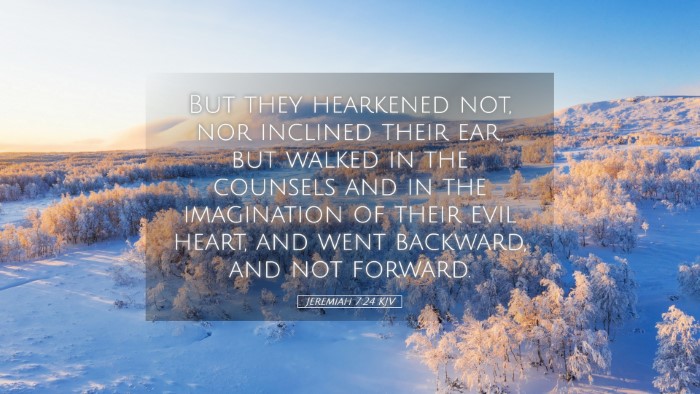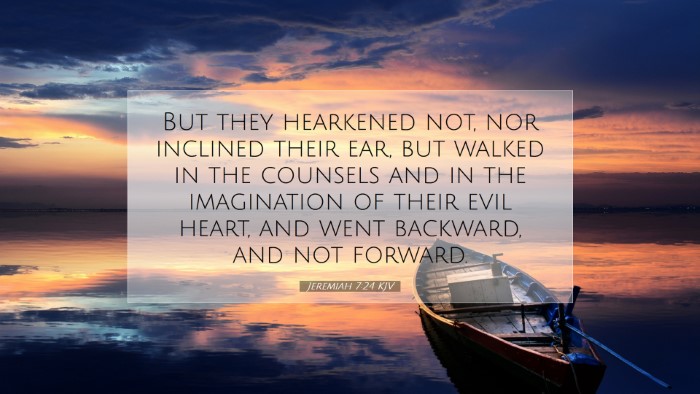Commentary on Jeremiah 7:24
Verse Reference: Jeremiah 7:24 - "But they did not obey or incline their ear, but followed the counsels and the dictates of their evil hearts, and went backward and not forward."
Introduction
This pivotal verse from the Book of Jeremiah highlights a crucial moment in the prophetic ministry of Jeremiah, where the heart of God's people is laid bare. The prophet stands as a voice of warning amid the people's obstinacy, calling attention to their refusal to heed divine counsel. This commentary synthesizes insights from various public domain sources, providing a comprehensive theological reflection on the implications of this verse.
Theological Insights
Jeremiah 7:24 encapsulates the rebellion of Israel against God's directives. The expression "did not obey" indicates a conscious and willful rejection of God’s commands. The following insights help us understand the theological depth of this passage:
- Obedience as a Measure of Faith: According to Matthew Henry, true faith is evidenced by obedience. The disobedience of the people reflects a lack of genuine faith in God's promises and character.
- The Role of the Heart: Albert Barnes emphasizes that the heart is the source of one's actions. The "evil hearts" mentioned show how internal dispositions lead to outward rebellion against God’s will.
- Backward Motion in Spiritual Journey: Adam Clarke points out that this regression signifies a progression further away from God’s intended path, illustrating the danger of spiritual apathy and neglect.
Contextual Background
The historical context of Jeremiah’s prophecy is crucial for understanding the severity of the message. Jeremiah ministered to Judah during a time of great moral and spiritual decay, a period leading up to the Babylonian exile. The people's refusal to listen to God's counselors can be traced to:
- The idolatrous practices that had permeated society.
- A false sense of security regarding the temple in Jerusalem, leading to complacency in spiritual matters.
- The resistant attitude towards prophetic warnings, showcasing human pride and rebellion.
Exegesis of Key Themes
When examining Jeremiah 7:24, several significant themes arise:
- Rejection of Divine Instruction:
The assertion that the people "did not obey" indicates a conscious refusal. Their unwillingness to "incline their ear" exemplifies a hardened heart that refuses correction and guidance.
- Consequences of Following Evil Desires:
The phrase "followed the counsels and the dictates of their evil hearts" reveals an active choice to pursue sin. This illustrates the biblical principle that the heart's inclination influences behavior and leads to inevitable consequences.
- Regression in Faith:
The directive that they "went backward" emphasizes a solemn reality: a person's spiritual journey lacks neutrality. There is no standing still; one is either progressing in faith or regressing toward destruction.
Contemporary Application
As modern readers, particularly pastors, theologians, and students of Scripture, we must consider how Jeremiah 7:24 applies to contemporary faith communities:
- Calls for Introspection:
Leaders and congregants alike should examine their own hearts. Are we listening to God's word, or are we allowing our desires to dictate our actions?
- Warning Against Complacency:
The illusion of security in religious practices, like attending church, can lead to spiritual decay. True faith manifests in obedience and a responsive heart to God’s calling.
- Encouragement to Pursue Righteousness:
Pastors can encourage their congregations to cultivate a relationship with God through prayer, study of Scripture, and communal accountability, aiming to move forward in their faith journeys.
Conclusion
Jeremiah 7:24 serves as a timeless reminder of the perils of a disobedient heart. The insights provided by Matthew Henry, Albert Barnes, and Adam Clarke provoke deep reflection on our personal and communal walks with God. As we navigate our spiritual journeys, let us endeavor to listen to the Lord, follow His guidance, and move forward in faith, lest we find ourselves regressing into the shadows of our evil inclinations.


